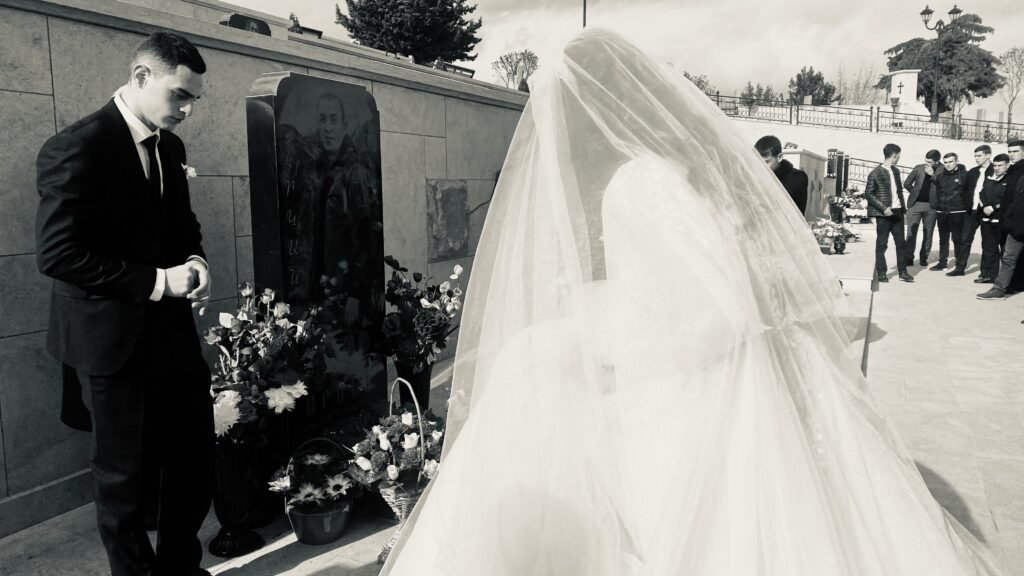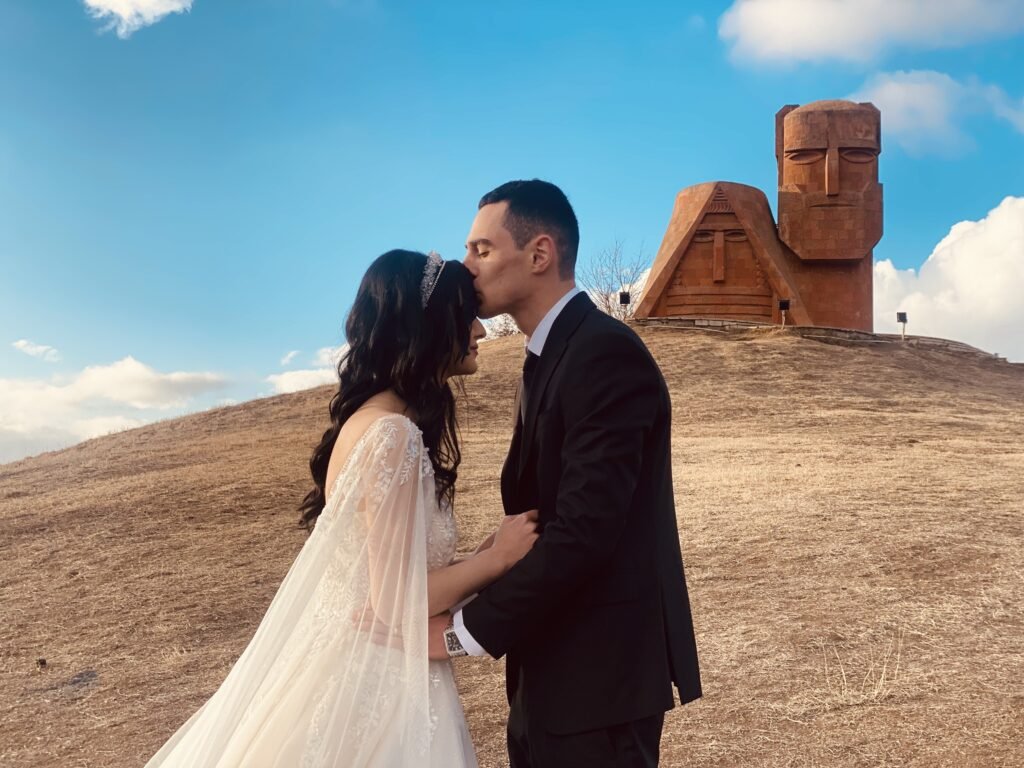
A young groom, holding the hand of his bride dressed in white, approaches the seemingly endless tombstones at the Stepanakert Memorial Complex to pay his respects and bow down to all those who gave their lives for his homeland. It is no coincidence that newlyweds Tigran Avetisyan and Kristine Davtyan first visit the grave of his father Armen, who died in the 2020 war. During the war, Tigran was a conscript soldier and served on the frontline with his brother Nairi. Their father was not only a father, but also a comrade-in-arms. On the battlefield, all roles change; everyone is a friend to everyone, a comrade-in-arms.
“If my father was physically present, I would have received the permission to get married from him. I think now he is smiling from above,” says Tigran. “I am sure that he would be the happiest and would give me wise advice in addition to wishes,” added the 21-year-old, who is currently working in the security forces of the Republic of Artsakh and has been waiting impatiently to marry his beloved Kristine.

Kristine is 21 years old and a singer. She defines love as “the determination to create a family in the face of difficulties, hardships and even under siege.” She emphasizes that love cannot be blocked; real love is heated in struggle, and Artsakh is in an honest struggle today. Love gives strength to the struggle. That’s why her songs are about the eternity of love; she writes in the Artsakh dialect to preserve its sweet sounds.
love cannot be blocked
“We have decided to have our wedding only with a church ceremony and register it legally,” says Tigran, referring to the absence of his father and the ongoing blockade of Artsakh.
Since December 12, the only road connecting Artsakh to Armenia was closed by a group of Azerbaijanis under the guise of eco-activists. As a result, 120,000 citizens of Artsakh, including 30,000 children, have been left without essential goods and services, including food, medicine and fuel. The situation becomes more dire when Azerbaijan cuts the electricity and natural gas supplies. There are also periodic disruptions of telephone and internet connections.
Despite these difficult conditions, the couple decided not to postpone their planned wedding, which they consider quite logical since there are no closed roads for love. A strong family also means overcoming problems and difficulties together, even under siege.
The bride’s bouquet was made with artificial flowers, as fresh flowers haven’t reached Artsakh in over 50 days, and it is difficult to find flowers in nature during the winter.
On the eve of St. Sarkis—the patron saint of lovers—the couple received the marriage blessing in the Holy Mother Church of Stepanakert.
Tatiana, the mother of the groom, was very excited. After losing her husband during the war, she was left with three sons. She was happy to witness this union and was certain that her husband would have supported it, even in such an emergency. “The preparations for the wedding distracted me from the topic of the blockade,” she said. “Of course, it is very difficult to organize a wedding without almost everything in such emergency conditions, but the most important thing is my son’s happiness,” she added. Tatiana is filled with hope that she will also marry her other two sons in Artsakh to honor her husband who sacrificed his life for that vision.
“Life goes on and young people should form a family and have many children,” said Der Matevos to the congregation gathered.” A strong country is one that has very strong families.”
The strength of the Artsakh family is also defined by the iconic monument “We are our mountains,” also known as “Tatik Papik.” The structure represents the elder couple of Artsakh in traditional costume, standing shoulder to shoulder as if the hill were cracked and they climbed up to stand with their feet planted in their native land. If the roof-shaped grandmother is placed on the grandfather, the structure would resemble a house. Young couples in Artsakh appreciate their “blessings.”
“Today is our wedding in Artsakh. In the future, the weddings of our children and grandchildren will be here, and just like the roots of ‘Tatik Papik’ are in our land, so are ours,” says Tigran while staring up at the monument with his wife Kristine.




“Love cannot be blocked.” Beautiful.
Congratulations 👏
Nice article, thanks Siranush! Congrats to the young couple! May they prosper and expand their roots on the homeland, they are the future of our Hajrenik: Hayastan & Artsakh!